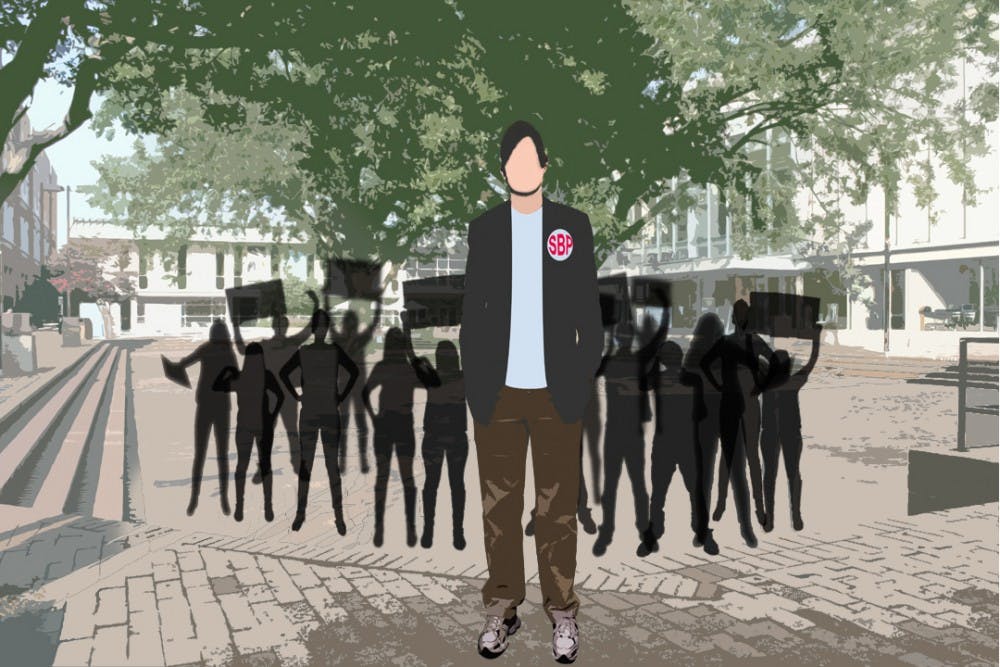The decision to run for student body usually comes early in a candidate’s undergraduate career.
“The thought was always definitely there,” said current Student Body President Hogan Medlin.
Like most successful candidates, Medlin was actively involved in a campaign his sophomore year — that of failed candidate Thomas Edwards.
“I was really involved more than I expected,” Medlin said. “Thomas’ campaign helped me wrap my head around the scope of the election’s mechanics.”
Most recent candidates launched their campaign the spring of their sophomore year, assembling a core team of advisers and laying the ground work for six months of platform writing and campaign worker recruitment.
“There’s a sense that candidates are soliciting votes early when building their campaign,” said former student body president candidate Shruti Shah, who lost to Medlin in 2010 and is now a member of The Daily Tar Heel’s editorial board.
Title VI of the Student Code expressly forbids this campaigning on a large-scale, public basis.
“In an ideal world, your campaign starts when you are certified,” Shah said.
But former candidates stressed the importance of these kinds of early interactions in building a successful campaign.
“A majority of people on campus are blank voters,” said senior Greg Strompolos, who ran for president in 2010. “If you come up to them and say, ‘I’m ‘X’ candidate and I support ‘Y’ values,’ then they’ll vote for you.”
Title VI allows for limited campaign building before the January declaration date, restricting candidates to “private” and “discreet” campaign activities.
“Discreet campaigning solely consists of workers and staff, and private campaigning is on a strictly personal basis with no more than five people,” Phillips said.
To get the day's news and headlines in your inbox each morning, sign up for our email newsletters.
With the rise of electronic communication in campaigns — support e-mail listservs and Facebook campaign groups among the preferred techniques — student congresses have been forced to amend the code to reflect these new opportunities for recruitment.
“The guiding principle for election law at Carolina is giving all candidates an even footing,” Phillips said.
White list, black list
Val Tenyotkin is dreaming of a white list.
Tenyotkin, a former student board of elections vice-chairman and Student Congress member, wanted to alter the University’s student code to clarify election policies during his tenure.
“It’s a vague code, and it’s difficult to make things clear,” said Tenyotkin, who received his doctorate degree at UNC in 2009.
His ‘white list’ plan would create a set list of acceptable election procedures, making any action beyond those procedures illegal and subject to punishment in the form of campaign fines. It would end the sometimes constant process of code interpretation and adjustment that figures so prominently in the current system, Tenyotkin said.
“The current language can be interpreted or misinterpreted,” Tenyotkin said. “Issues arise when candidates try to circumvent the spirit but not the letter of the law.”
The Board of Elections is currently investigating potential candidate Rick Ingram, a junior, to see if campaign recruitment e-mails sent to students violate election law.
Board of Elections members say a decision should be reached on the case sometime this week.
Former candidates have said that getting an early start on campaigning allowed their staff to devote the proper attention to the composition of a campaign platform.
Ultimately, it’s simple early campaign outreach, rather than candidate platforms, that wins elections, said Ryan Morgan, a former Board of Elections chairman.
“There’s not a lot of real convincing of voters in a student body president election,” Morgan said. “It’s mostly about name recognition. I don’t think that a lot of people actually read the platforms.”
Shah and other candidates recognized this disconnect between their early efforts to build a platform and the effect pre-campaigning had on their election.
“You really hope that people are listening to what you have to say,” Shah said. “There were times where it felt like it was less about what I was saying, and more about how many people I knew.”
Contact the University Editor at university@dailytarheel.com.



